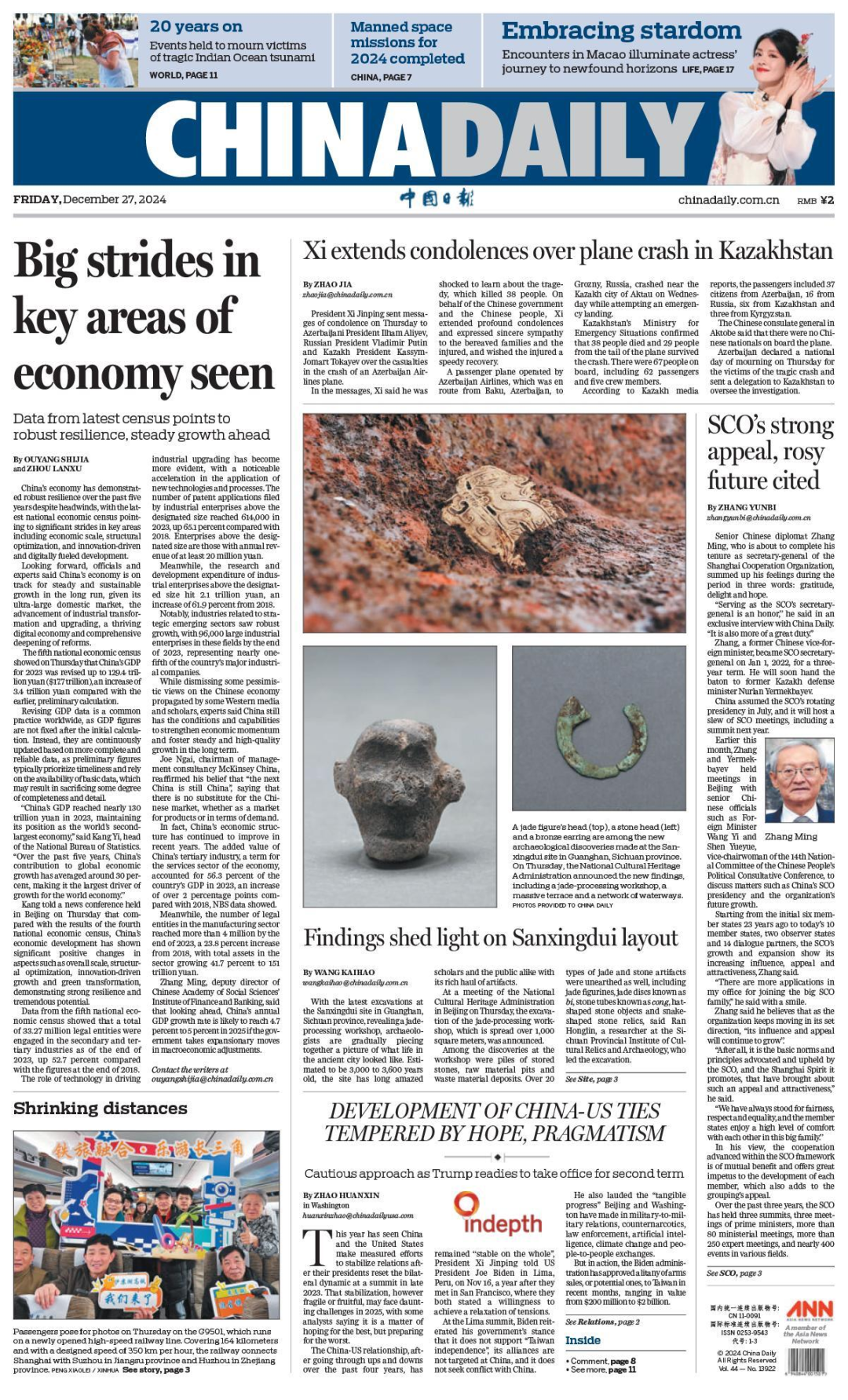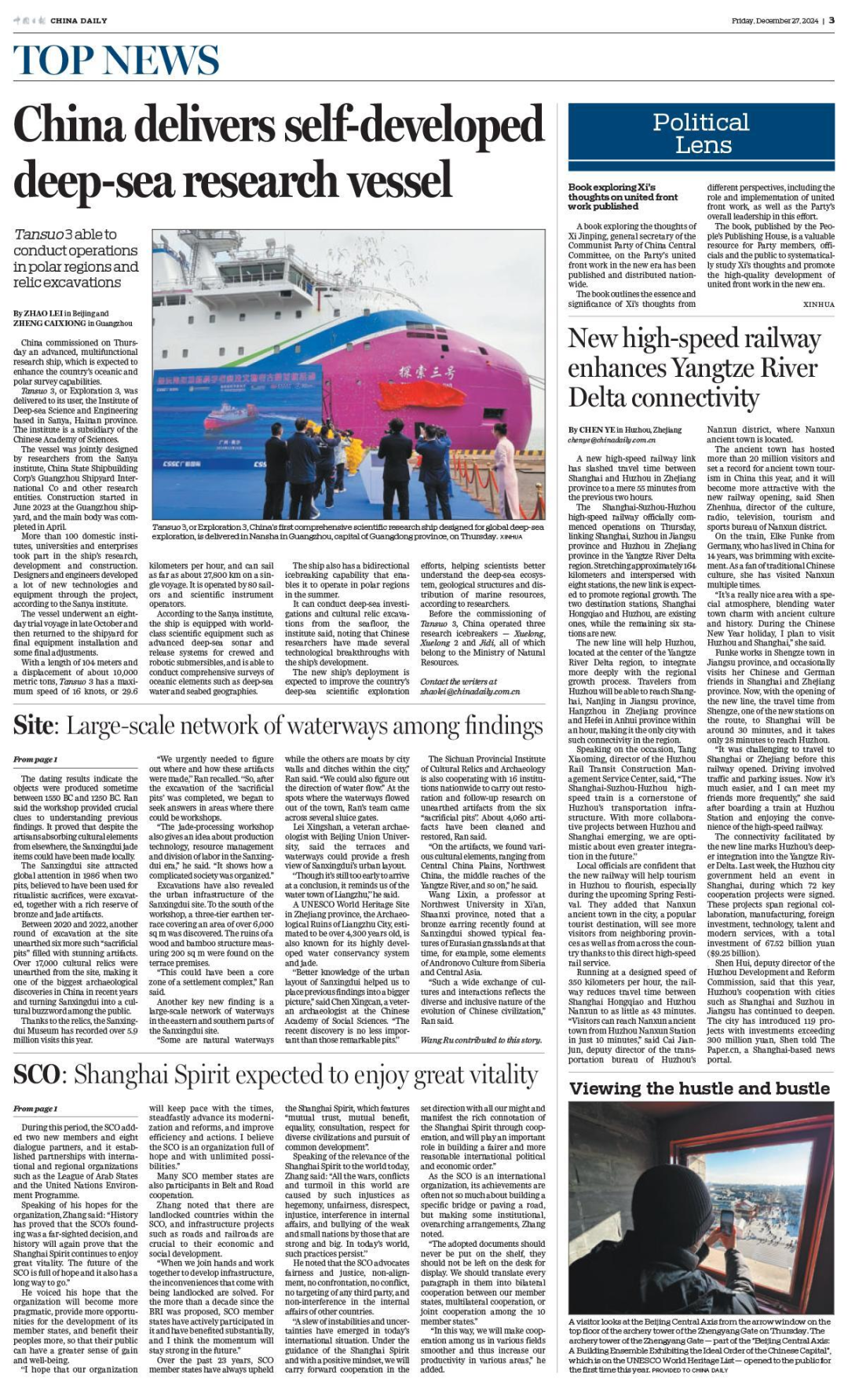近日,上海合作组织秘书长张明接受了《中国日报》专访,就担任秘书长三年来上合组织发展成就与下步发展前景接受记者提问。专访全文(中英文)如下:


专访上合组织秘书长张明:上合感召力、吸引力提升源自“上海精神”
即将完成三年任期的上海合作组织秘书长张明日前在接受英文《中国日报》专访时,用“感谢”、“欣慰”、“希望”这三个词概括了自己的心情。
“时间过得很快,”他说。“担任上合组织的秘书长是一份荣誉,但它更多的是一份沉甸甸的责任。”
根据上合组织相关规定并经组织元首理事会批准,张明于2022年1月1日出任上合组织秘书长,任期3年。上合组织副秘书长叶尔梅克巴耶夫即将担任下一任上合组织秘书长。
从最初的6个成员国发展到如今的10个成员国、2个观察员国以及14个对话伙伴,张明认为,上合组织的发展扩大体现了它的影响力、感召力、吸引力的提升。
“在我的办公室里边还有更多的加入上合组织大家庭的申请,”他微笑地说道。
他认为,上合组织按照这个方向继续前进,“影响力和感召力还会持续增长”。
“说到底,是上合组织所倡导、坚持的基本的准则和原则、所倡导的‘上海精神’,赋予了这样的感召力、吸引力,”他说。
“我们一直主张公平、尊重、平等,成员国在这个大家庭里,成员间彼此的舒适度很高。”
他认为,上合组织框架内推进的合作是一种互惠互利的合作,给每一个成员国的发展都带来了巨大的推动力,这也会产生感召力。
三年来,上合组织共举行了三次峰会、三次总理会晤、80多次各个职能部门的部长级会议、250多次专家级会议、近400多场各领域的活动。
在这期间,上合组织成员国增加了两个新成员,对话伙伴也增加了八个席位。上合还同阿拉伯国家联盟、联合国环境署等国际和区域性组织建立起伙伴关系。
张明说:“首先我要感谢习近平主席以及各成员国领导人给予我的充分信任,任命我担任这样一个重要的职务。感谢各个成员国、观察员国、对话伙伴国以及我们的伙伴组织给予我的支持。”
他还特别感谢了上合组织秘书处和他的团队,“他们以热情、责任感、专业态度,完成了繁重的工作任务”。
三年来,张明遍访上合组织成员国、多个观察员国家以及联合国等国际组织,了解它们对上合的诉求和建议。
在谈到对上合组织的希望,张明说:“历史证明建立上合组织是一个前瞻性的决定,历史也将继续证明,上合精神将具有巨大的生命力。未来的上合组织充满希望,也任重道远。”
他表示,希望上合组织更加务实,为成员国的发展提供更多的机会,更多惠及民众,让他们体验到身处上合大家庭的获得感、归属感和幸福感。
“我希望我们的组织与时俱进,坚定的推进现代化改革,提高我们的工作效率、行动力和执行力。我相信上合组织是一个充满希望和拥有无限可能的组织。”
很多上合组织成员国同时也是 “一带一路”合作的参与国。
张明说:“我们的组织的成员国基本都分布在历史上这个丝绸之路的沿线,无论是陆上丝绸之路还是海上丝绸之路,提起‘一带一路’、提起丝绸之路,我们成员国的人民都会从心底里感到一种像丝绸一般的温馨。”
谈到“一带一路”倡议对于对接各成员国之间的发展战略、促进经济协作方面所起的作用,张明指出,上合组织内部不乏内陆国,公路、铁路等基础设施项目对它们的经济发展、社会发展至关重要。
“我们联手合作发展基础设施,它们面临的、作为内陆国所带来的不便也就解决了。‘一带一路’倡议提出十多年来,上合成员国积极踊跃参与,从中获益巨大,我想今后还会保持这样强劲的发展势头。”
成立23年来,上合组织的各成员国始终秉持“上海精神”,即“互信、互利、平等、协商、尊重多样文明、谋求共同发展”。
谈到“上海精神”对于当今世界的现实意义,张明说:“我们这个世界上所发生的战争也好、冲突也好、动荡也好,无不源于霸权主义,不公平、不尊重、不公正、干涉内政,以强凌弱、以大欺小等等这些不公正的现象。今天这个世界,依然存在这些现象。”
他指出,上合组织主张公平正义、不结盟、不对抗、不冲突、不针对任何第三方、不干涉别国内政。
“当今国际形势中出现了一系列的不稳定性和不确定性。我们在‘上海精神’的指引之下,秉持积极心态,继续朝着既定方向全力推动合作,在合作中彰显‘上海精神’丰富的内涵,将为构建更加公平、更加合理的国际政治经济秩序起到重要的作用。”
过去的三年里,上合组织举行了三次峰会,通过成果文件70多份。张明指出,上合组织作为一个国际组织,它的成果往往并不是说修了一座桥或铺了一段路,而是做一些制度性安排。
“通过的文件绝不能束之高阁,不能把它放在办公桌上去欣赏,我们应该把里面的每一段文字都化为我们成员国彼此之间的双边合作、多边合作以及10个成员国之间的共同合作。”
“这会使我们之间各个领域的合作更加畅通,无形中提升了我们之间各方面的生产力。”
SCO's strong appeal, rosy future cited
Senior Chinese diplomat Zhang Ming, who is about to complete his tenure as secretary-general of the Shanghai Cooperation Organization, summed up his feelings during the period in three words: gratitude, delight and hope.
"Serving as the SCO's secretary-general is an honor," he said in an exclusive interview with China Daily. "It is also more of a great duty."
Zhang, a former Chinese vice-foreign minister, became SCO secretary-general on Jan 1, 2022, for a three-year term. He will soon hand the baton to former Kazakh defense minister Nurlan Yermekbayev.
China assumed the SCO's rotating presidency in July, and it will host a slew of SCO meetings, including a summit next year.
Earlier this month, Zhang and Yermekbayev held meetings in Beijing with senior Chinese officials such as Foreign Minister Wang Yi and Shen Yueyue, vice-chairwoman of the 14th National Committee of the Chinese People's Political Consultative Conference, to discuss matters such as China's SCO presidency and the organization's future growth.
Starting from the initial six member states 23 years ago to today's 10 member states, two observer states and 14 dialogue partners, the SCO's growth and expansion show its increasing influence, appeal and attractiveness, Zhang said.
"There are more applications in my office for joining the big SCO family," he said with a smile.
Zhang said he believes that as the organization keeps moving in its set direction, "its influence and appeal will continue to grow".
"After all, it is the basic norms and principles advocated and upheld by the SCO, and the Shanghai Spirit it promotes, that have brought about such an appeal and attractiveness," he said.
"We have always stood for fairness, respect and equality, and the member states enjoy a high level of comfort with each other in this big family."
In his view, the cooperation advanced within the SCO framework is of mutual benefit and offers great impetus to the development of each member, which also adds to the grouping's appeal.
Over the past three years, the SCO has held three summits, three meetings of prime ministers, more than 80 ministerial meetings, more than 250 expert meetings, and nearly 400 events in various fields.
During this period, the SCO added two new members and eight dialogue partners, and it established partnerships with international and regional organizations such as the League of Arab States and the United Nations Environment Programme.
Speaking of his hopes for the organization, Zhang said: "History has proved that the SCO's founding was a far-sighted decision, and history will again prove that the Shanghai Spirit continues to enjoy great vitality. The future of the SCO is full of hope and it also has a long way to go."
He voiced his hope that the organization will become more pragmatic, provide more opportunities for the development of its member states, and benefit their peoples more, so that their public can have a greater sense of gain and well-being.
"I hope that our organization will keep pace with the times, steadfastly advance its modernization and reforms, and improve efficiency and actions. I believe the SCO is an organization full of hope and with unlimited possibilities."
Many SCO member states are also participants in Belt and Road cooperation.
Zhang noted that there are landlocked countries within the SCO, and infrastructure projects such as roads and railroads are crucial to their economic and social development.
"When we join hands and work together to develop infrastructure, the inconveniences that come with being landlocked are solved. For the more than a decade since the BRI was proposed, SCO member states have actively participated in it and have benefited substantially, and I think the momentum will stay strong in the future."
Over the past 23 years, SCO member states have always upheld the Shanghai Spirit, which features "mutual trust, mutual benefit, equality, consultation, respect for diverse civilizations and pursuit of common development".
Speaking of the relevance of the Shanghai Spirit to the world today, Zhang said: "All the wars, conflicts and turmoil in this world are caused by such injustices as hegemony, unfairness, disrespect, injustice, interference in internal affairs, and bullying of the weak and small nations by those that are strong and big. In today's world, such practices persist."
He noted that the SCO advocates fairness and justice, non-alignment, no confrontation, no conflict, no targeting of any third party, and non-interference in the internal affairs of other countries.
"A slew of instabilities and uncertainties have emerged in today's international situation. Under the guidance of the Shanghai Spirit and with a positive mindset, we will carry forward cooperation in the set direction with all our might and manifest the rich connotation of the Shanghai Spirit through cooperation, and will play an important role in building a fairer and more reasonable international political and economic order."
As the SCO is an international organization, its achievements are often not so much about building a specific bridge or paving a road, but making some institutional, overarching arrangements, Zhang noted.
"The adopted documents should never be put on the shelf, they should not be left on the desk for display. We should translate every paragraph in them into bilateral cooperation between our member states, multilateral cooperation, or joint cooperation among the 10 member states."
"In this way, we will make cooperation among us in various fields smoother and thus increase our productivity in various areas," he added.